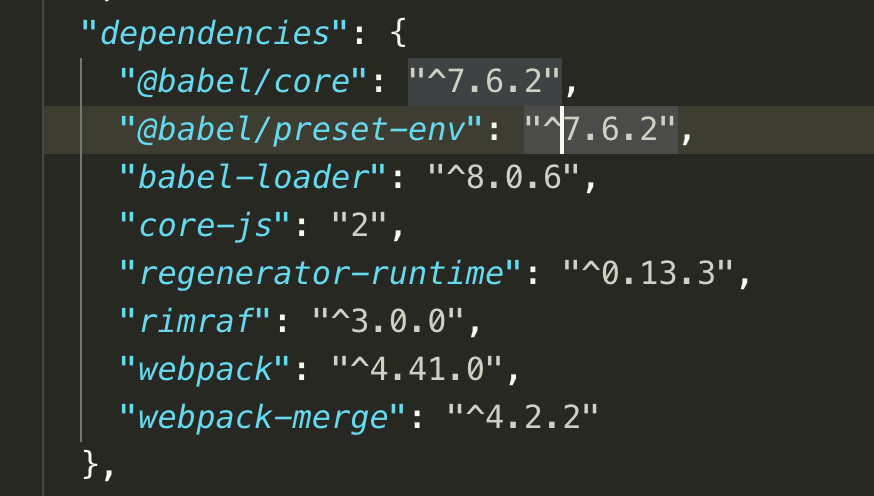webpack学习笔记(6)-babel-loader的使用
sevenCon opened this issue · 0 comments
前言
这里是webpack系列的第6章, 十一假期的假期也过完了, 但是webpack感觉还有很多地方想要了解, 特别是在babel这一块,babel的改动越来越大, 当然方向是朝着我们希望的方向去迈进的, 越来越好用.
而babel-7.0改动针对以下的几点, 做了很大的改进.
- Developers don't know what regenerator-runtime is, they just want to use generators/async functions.
- Many developers are confused as to why a runtime is needed at all or why Babel doesn't compile Promise, Object.assign, or some other built-in.
- Developers are confused with the difference between transform-runtime the Babel plugin and the runtime itself, babel-runtime.
- Complaints about generated code size since babel-polyfill includes all polyfills (although now we have useBuiltIns) and no one knowing about external-helpers
总结了一下,
- 有那么几点
regenerator-runtime为什么要另外安装? - 为什么不自动编译
Object.assign, Promise, Set等等Api? transform-runtime,runtime有什么区别?babel-polyfill的引入太大怎么办?.
babel-7.0 就是改进了以上的问题.
但是今天的主要目标不是上面提到的几点, 这里只做一个基本的认识, 以成功利用babel 7来协助webpack打包我们编写我们的业务代码为目的.
从babel-6.0之后增加了useBuiltIns属性可以有效的减少polyfill的大小, loose模式下的打包情况等等,其他的一些库比如babel-runtime,core-js,babel-transform-runtime的作用, babel-polyfill的库会渐渐弃用, 使用core-js和regenerator-runtime来进行polyfill等等, 变化有很多, 一章装不下, 这些的主要内容, 我都打算捋一遍. 但是今天可惜, 篇章有限.
babel的配置文件
babel的配置文件自从babel-7版本之后, 有2中类型, 一种是基于项目的全局配置, 在项目的根目录上的文件名为babel.config.js, 另一种是基于相对文件目录的.babelrc,.babelrc.js或者package.json#babel
这2种类型的配置可以混合使用, 也可以单独使用, 在进行多个子项目分别使用不同的babel配置的时候, babel.config.js配合overrides的属性使用是一种不错的思路, 另外也可以在子目录上用配置文件.babelrc.
注意: 经过测试,如果在项目的根目录上, 如果同时有
.babelrc,babel.config.js, 在属性上有冲突的话,那么.babelrc具有更高的优先级.
这里以下的demo基于
webpack-4.x,babel-7.x,babel-loader-8.x.
webpack的babel-loader的基本配置
// webpack.config.js
module: {
rules: [
{
test: /\.js$/,
loader: 'babel-loader'
}
]
}
创建.babelrc配置文件
{
"presets": [
[
"@babel/preset-env",
{
"modules": false,
"useBuiltIns": "usage"
}
]
],
"plugins": []
}
安装必要的包
yarn add @babel/core @babel/preset-env core-js@2 regenerator-runtime
yarn add webpack@4 babel-loader@8
或者
yarn add @babel/core @babel/preset-env @babel/runtime-corejs2
yarn add webpack@4 babel-loader@8
上面的core-js@2 regenerator-runtime可以替换成 后面的@babel/runtime-corejs2的.
@babel/runtime是什么?
@babel/runtime is a library that contain's Babel modular runtime helpers and a version of regenerator-runtime.
@babel/runtime包含模块化的babel的helper函数和regenerator-runtime
在打包的时候, 一些重复使用的函数, 会被提取出来 , 代码运行时的模块化的helper函数的集合
class Circle {}
转化成:
function _classCallCheck(instance, Constructor) {
//...
}
var Circle = function Circle() {
_classCallCheck(this, Circle);
};
_classCallCheck这个函数是自动生成的, 作用是用来创建Circle的的实例的时候,进行必要的类型检查.诸如此类的方法在babel里面称之为helper方法.
regenerator-runtime是用来编译async/await, generator/yield等生成器函数.
@babel/runtime-corejs2
@babel/runtime-corejs2 is a library that contain's Babel modular runtime helpers and a version of regenerator-runtime as well as core-js.
@babel/runtime-corejs2包含了@babel/runtime, corejs2, regenerator-runtime
corejs2是es5+的各个版本库的polyfill实现的方法, 比如Promise的polyfill的实现等等.
@babel/plugin-transform-runtime
A plugin that enables the re-use of Babel's injected helper code to save on codesize.
@babel/plugin-transform-runtime依赖于@babel/runtime
提取公共的代码, 减少打包后的文件体积大小.
除了可以直接提取一些常用公共的函数, 对runtime的部分helper函数生成的方便进行了一些优化之外, 还有一些额外的工作, 比如可以自动的poly-fill, 比如Set, Map, Promise, 自动使用@babel/runtime/regenerator编译generator/yield部分的内容,
此外还对以上的编译过程进行定义,
// .babelrc
{
"plugins": [
[
"@babel/plugin-transform-runtime",
{
"corejs": false,
"helpers": true,
"regenerator": true,
"useESModules": false
}
]
]
}
有几个关键的配置
corejs: number | false, 使用特定的版本的corejs, 比如corejs: 2(依赖@babel/runtime-corejs2, 需要额外安装).helpers: boolean, 是否以内敛的方式插入helper函数.polyfill, 这个参数会在babel7.0弃用, 并自动设置默认开启regenerator, 默认是true, 是否自动转码generator/yield, async/await函数
此外还有一些可选的options, useESModules使用es6的模块加载, useBuiltIns根据源代码, 自动编译并引用polyfill部分.
所以, 总的来说, plugin-transform-runtime的作用, 除了对在打包的时候对helper的提取公共优化, 还有自动的polyfill的功能, 但是这个polyfill是有缺陷的, 它不能polyfill实例的函数, 因为它不会拓展原生全局对象, 比如[2].includes(2), 就不能使用, 这确实非常的限制,但除此之外, 和原@babel/polyfill的作用是一样的.
举个优化helper引入的例子
function _classCallCheck(instance, Constructor) {
//...
}
var Circle = function Circle() {
_classCallCheck(this, Circle);
};
经过编译之后
var _classCallCheck = require("@babel/runtime/helpers/classCallCheck");
var Circle = function Circle() {
_classCallCheck(this, Circle);
};
这意味着每个包含类的文件都将具有_classCallCheck每次重复的功能。
使用@babel/plugin-transform-runtime,那么这个函数将被提取到runtime里面,进行单独打包, 而其他地方需要的时候, 直接使用就可以了.
@babel/polyfill
@babel/polyfill在最初的设置中, 可以对我们引用的es5+进行polyfill, 包括对象方法, 和实例方法, 还有一些新的api, Set, Map, Promise, async/await等等, 特点是大而全, 不需要我们做任何操作, ES5+的代码全部打包, 但是会把我们不需要的一些polyfillapi的库都打包进来, 十分的臃肿.
在babel6.0之前的, 我们常用的一个是在打包的入口, 加入
require("babel-polyfill");
// 或者
import "babel-polyfill";
// 或者
module.exports = {
entry: ["babel-polyfill", "./app/js"]
};
在babel7.4之后的使用, 弃用babel-polyfill, 改用core-js的方式引入
import "core-js/stable";
import "regenerator-runtime/runtime";
总结
这总结了利用babel7.0的版本, 对babel捋了一下, 主要介绍webpack的babel-loader安装和使用,依赖的安装. 还要其他的一些babel的插件, @babel/runtime, @babe/runtime-corejs2, @babel/plugin-transform-runtime, @babel/polyfill.
参考
https://babel.docschina.org/docs/en/babel-runtime
https://babel.docschina.org/docs/en/babel-plugin-transform-runtime#installation
https://babeljs.io/docs/en/babel-preset-env#corejs
